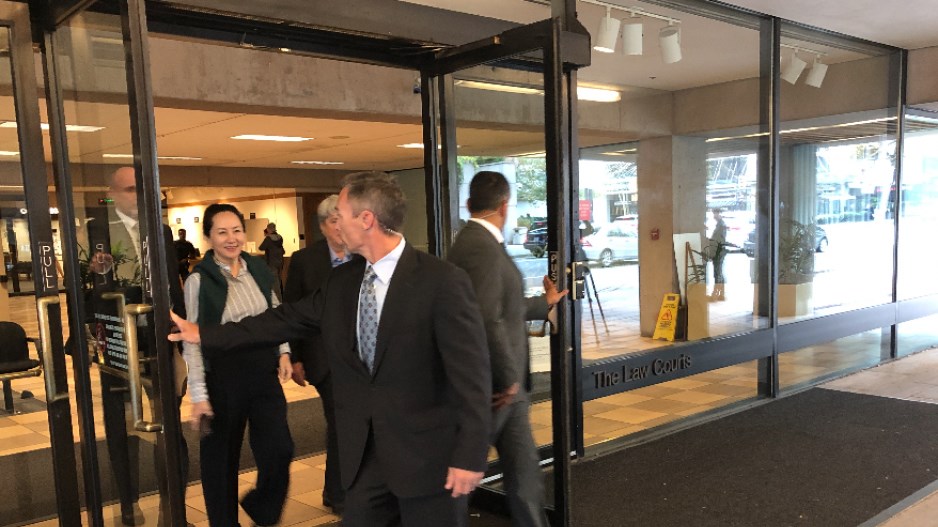The extradition hearings for Huawei Technologies Co. Ltd. CFO Meng Wanzhou resumed Monday in Vancouver, and the proceedings this week became the first time the case presented witnesses to answer questions from both Crown and defence lawyers.
The witnesses are expected to be officers with either the RCMP or the Canada Border Services Agency (CBSA) who partook in the arrest of Meng at Vancouver International Airport on Dec. 1, 2018. Crown counsel and defence lawyers will almost certainly centre their questions around the arrest process – and whether or not there were extraordinary procedures that took place in the arrest.
The first witness called on Monday was RCMP Const. Winston Yep, the major-crimes unit officer based locally who served Meng’s arrest warrant. Questioned first by Crown lawyer John Gibb-Carsley, Yep said he had no prior knowledge of the U.S. extradition request until being told to handle an “urgent” matter on the afternoon of Nov. 30 - a day before the arrest.
That was when Yep received the extradition request from the U.S., and he added that he then went to Vancouver International Airport to confirm with the CBSA that Meng was on the plan coming to YVR. Nothing else was discussed, Yep said.
When asked by Gibb-Carsley if anything about the Meng arrest was unusual, Yep said everything was routine. He noted there was a casual suggestion in a text message by another RCMP officer of potentially arresting Meng on the plane - but that suggestion was quickly and roundly dismissed on the grounds of public safety considerations (i.e. other passengers being present during the arrest).
Yep added it was always the plan for him to serve the warrant to Meng because it is RCMP jurisdiction - but also always the plan for the CBSA to conduct its work first.
”The airport is CBSA jurisdiction,” he told the court. “When a person comes into Canada, you go through the border check first.”
In two other extradition arrests he handled directly, Yep noted the suspects were either already in CBSA custody or have passed though the border check process.
However, Yep did note that he knew the case would be high-profile as soon as he received the extradition request - even if he did not know Meng’s name prior to arrest.
”I do know that Huawei is one of the world’s largest telecom companies,” Yep said. “... I notified my supervisor because I knew it was high-profile. The CFO of Huawei is a high-profile individual.”
In the afternoon, Meng lawyer Richard Peck began cross-examination of Yep by targetting a number of what the attorney deemed irregularities that could raise suspicion to the soundness of the process. Peck began by noting Yep's record-keeping of the arrest operation - emphasizing that a timeline of events on Dec. 1 was requested by Gibb-Carsley prior to the arrest but was not kept by the RCMP officer.
Yep replied that the timeline was part of a list of guidelines for handling the arrest, and its steps were not required to be followed in precise detail depending on the situation.
Peck also noted that Meng was not scheduled to enter Canada on Dec. 1, but rather trying to connect to another flight going to Mexico. Thus, the CBSA jurisdiction to question Meng doesn't appear to apply in this case, the attorney argued.
He also questioned Yep's statements earlier about not arresting Meng on the plane as a public-safety consideration, noting that arresting Meng "was part of a financial crime discussion" and there were no evidence of the Huawei executive every being guilty of partaking in violent crimes.
Yep responded by saying the RCMP must assume nothing when it comes to making an arrest - and the protocol calls for taking all the risks of safety to others in the area of the arrest into account.
"Anyone is capable of anything at any point," Yep said.
The court session is set to resume Tuesday with Peck continuing the cross-examination of Yep.
What happened upon Meng’s arrival in Canada on a Cathay Pacific flight from Hong Kong on Dec.1 has been central of the Huawei executive’s defence since day one of the hearings. Meng was detained immediately upon arrival by CBSA agents who collected items such as laptops and mobile devices, but the Chinese tech executive was not formally arrested by RCMP officers until after three hours of CBSA questioning.
The Meng defence has said it suspected there was a change of plans for authorities conducting the arrest on Dec. 1, 2018 – in that the original plan was for RCMP officers to board the plane and arrest Meng before she got off the plane. Instead, defence lawyers said the plan to arrest Meng after a three-hour CBSA detention – during which evidence was collected without informing Meng of her rights – constitutes a possible conspiracy in coordinating her arrest with U.S. authorities.
The Attorney General of Canada has maintained that the procedure was standard and routine; Crown counsel noted that Meng needed to be cleared by the CBSA to enter Canada in order for RCMP officers to have jurisdiction to make the arrest. Crown lawyers added that little – if any – of the information collected during the detention has been sent to the United States.
The topic of what led to the three-hour detention without arrest makes up the bulk of Meng’s abuse-of-process accusation against Canadian authorities carrying out the extradition request from the U.S. Department of Justice. The questioning of witnesses may last beyond the court time scheduled this week by Associate Chief Justice Heather Holmes for the case, necessitating the use of additional court dates in November.




